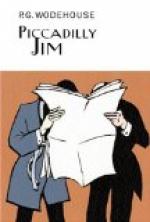The reason for Jimmy’s lack of enthusiasm as he surveyed the portion of his native land visible from his doorway is not far to seek. The Atlantic had docked on Saturday night, and Jimmy, having driven to an excellent hotel and engaged an expensive room therein, had left instructions at the desk that breakfast should be served to him at ten o’clock and with it the Sunday issue of the Chronicle. Five years had passed since he had seen the dear old rag for which he had reported so many fires, murders, street-accidents, and weddings: and he looked forward to its perusal as a formal taking seisin of his long-neglected country. Nothing could be more fitting and symbolic than that the first morning of his return to America should find him propped up in bed reading the good old Chronicle. Among his final meditations as he dropped off to sleep was a gentle speculation as to who was City editor now and whether the comic supplement was still featuring the sprightly adventures of the Doughnut family.
A wave of not unmanly sentiment passed over him on the following morning as he reached out for the paper. The sky-line of New York, seen as the boat comes up the bay, has its points, and the rattle of the Elevated trains and the quaint odour of the Subway extend a kindly welcome, but the thing that really convinces the returned traveller that he is back on Manhattan Island is the first Sunday paper. Jimmy, like every one else, began by opening the comic supplement: and as he scanned it a chilly discomfort, almost a premonition of evil, came upon him. The Doughnut Family was no more. He knew that it was unreasonable of him to feel as if he had just been informed of the death of a dear friend, for Pa Doughnut and his associates had been having their adventures five years before he had left the country, and even the toughest comic supplementary hero rarely endures for a decade: but nevertheless the shadow did fall upon his morning optimism, and he derived no pleasure whatever from the artificial rollickings of a degraded creature called Old Pop Dill-Pickle who was offered as a substitute.
But this, he was to discover almost immediately, was a trifling disaster. It distressed him, but it did not affect his material welfare. Tragedy really began when he turned to the magazine section. Scarcely had he started to glance at it when this headline struck him like a bullet:
PICCADILLY JIM AT IT AGAIN
And beneath it his own name.
Nothing is so capable of diversity as the emotion we feel on seeing our name unexpectedly in print. We may soar to the heights or we may sink to the depths. Jimmy did the latter. A mere cursory first inspection of the article revealed the fact that it was no eulogy. With an unsparing hand the writer had muck-raked his eventful past, the text on which he hung his remarks being that ill-fated encounter with Lord Percy Whipple at the Six Hundred Club. This the scribe had




